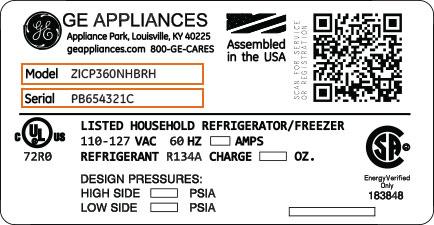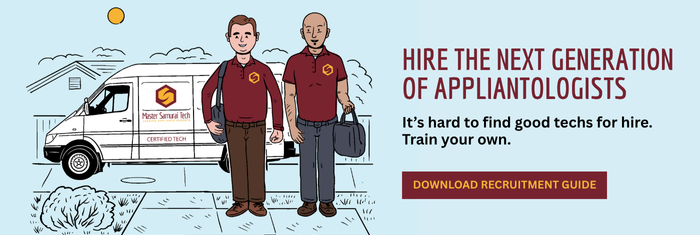4 Essential Tips for CSRs
There are many standard items a CSR should collect from the customer (name, address, contact information, type of appliance, etc.), but I'd like to focus on the key features of a good service ticket that may be overlooked by some. If you make sure to follow these tips, you'll set your techs up for the easiest prediagnosis and best service calls possible.
1. Collect a valid model number

A model number is essential for a tech's prediangosis. Without it, he cannot get the correct information for the appliance, and he'll effectively be going in blind.
There are a few tricks to help customers give you a correct model number. For one thing, you should know where to direct them to look for the tag, depending on the appliance. As an example, in refrigerators, you'll usually find the model number tag on the inside wall or ceiling of the fresh food compartment.
Once the customer has given you the model number, you can do an easy search of the web to see if it's a real number. If it doesn't pull up any (or many) results, it's probably no good.
If the customer is having a hard time reading out the model number to you correctly, there's an easy way to remedy that: just have them use one of those fancy smartphones that everyone is carrying around these days to send you a picture of the tag.
2. Distill the customer's description to a coherent problem statement
Customer's aren't technicians. Good for us, 'cause we'd be out of a job if they were. But that means that they usually don't have the most precise or accurate way of explaining the symptoms the appliance has.
As the CSR, you need to ask informed questions and listen carefully to the customer's description, teasing out the actual details form them. A customer might just tell you, "It needs a new belt." But as an informed CSR, you know that their dishwasher does not, in fact, have a belt. That would be your cue to then ask how the machine is acting that makes the customer think it needs a new belt.
There are also some issues where you want to get very specific pieces of information. Leaks are a good example: as soon as the customer tells you that the appliance is leaking, you should ask in what area they're seeing the water. Similarly, if the customer's complaint is long dry times in a dryer, you should immediately start asking questions about their venting situation.
A coherent problem statement always takes the form of "what is the machine doing that it shouldn't be doing, and what is it not doing that it should be doing." You want to collect symptoms, not customer diagnoses.
3. Rule out common, simple problems
Here's the part of the call that really separates a good CSR from the rest. Do you know how to spot issues that have either simple solutions, or that are simply due to customer error?
Is the customer seeing poor wash results in their new, high-efficiency top-load washer? Ask what kind of detergent they're using. If they come back with some eco-friendly, off-brand, non HE detergent, you've identified the problem right there. You've got to use HE detergents for HE machines, and the customer needs to know that.
Is the customer's refrigerator display acting funny after a thunderstorm? Tell them to unplug the appliance for a few minutes and then plug it back in. Every now and then, funky electronics issues can be due to power spikes, and a quick reboot is all that's needed. Just like IT work!
These types of issues can both waste a tech's time and cause customer dissatisfaction, since they might have to pay a service call fee just for a tech to tell them to use a different kind of detergent. If you can eliminate this dead weight, you'll improve both the efficiency and reputation of your company.
This is where it really pays off for a CSR to be well educated in how all major appliances work and what common problems look like.
4. Set up proper expectations
Finally, as well as collecting the information the tech needs, you should also be setting up the correct expectations for the customer. Explain your pricing structure, especially how much they'll be paying just for the tech to make the trip. Give a brief summary of what a service call from your company looks like, and how much a repair could run.
Being upfront about these things is the best way to ensure customer satisfaction. Did the customer balk at your diagnostic fee and hang up? Odds are they would have been a bad customer anyway, so you helped your tech dodge a bullet.
A good CSR can make a huge difference for the business as a whole with just a few well placed questions and pieces of advice given over the phone. That combined with some basic understanding of appliance operation will place you amongst the most valuable CSRs out there.
That's exactly the kind of stuff we teach in our 5-Star Customer Support Course. If you want to make your service call tickets the best they can be, head on over at the Master Samurai Tech Academy.
-
.png) 6
6




2 Comments
Recommended Comments